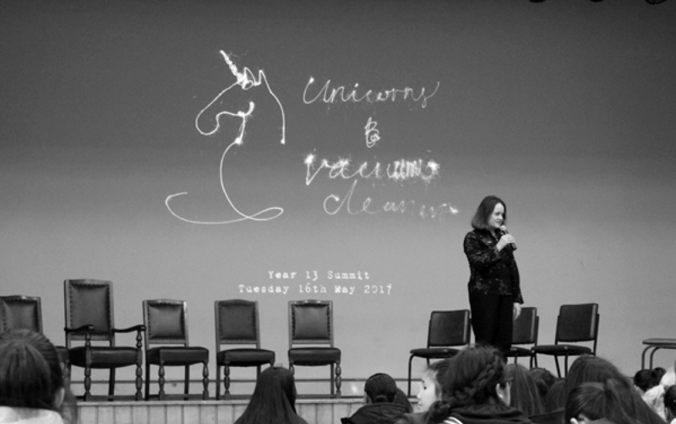This is the third posting chronicling the journey of a collaborative Professional Learning Group at Epsom Girls Grammar School. The focus of this Community of Schools (COS / COL) PLG inquiry has been tertiary preparedness in senior school students: strengthening transition pathways for students beyond the high school environment.
These are the highlights of the third year of the PLG journey; the second year of running the Unicorns and Vacuum Cleaners: year 13 learning summit.

Jonathan: Our PLG’s main focus this year was on revising the structure and content of the conference day, which we based on feedback gathered last year after running the very first UVC Summit in 2017.
The key changes include:
- adjusting the timing of events throughout the day to allow workshops to run for 40 mins instead of 30 mins
- adding in a third workshop option for students (replacing a Q+A session that we ran last year)
- introducing new workshops that cater to our student’s acknowledgment (via the feedback we received last year) that workshops based around “bigger-picture” issues were of most benefit. Issues such as car management, surviving flatting, matching your career pathway with a world-issue you want to be a part of and unpacking the concept of being adaptive, are some of the key new workshops that speak closely to this point.
Other workshops that featured throughout the day covered:
- academic research/libraries
- employability skills
- how to be a more confident speaker
- philosophical thinking
- surviving university lectures
- managing your finances
- “being adult”
- academic referencing
- mindfulness practice
This year’s summit also featured a greater connection with the Tertiary Sector.
- AUT ran a workshop around the concept of being an adaptive learner
- Massey University collaborated with Ben Jackson’s workshop (another one of our amazing teachers at EGGS) titled ‘Surviving University Lectures 101’ by sending their student ambassador
- University of Auckland library staff joined our librarians in presenting their workshops
- Canterbury University collaborated with EGGS Deputy Principal, Kate Slattery on her presentation titled ‘Being Adult’.
Over the rest of this year, following on from the conference, the PLG focus has been on developing ways to present and measure the concept of student agency in our own teaching subjects and Year 12/13 classes. We believe that we need to look at our teaching practices to ensure that we are establishing teaching environments that facilitate student agency as a key skill for success outside of the secondary school environment.
Michele: The changes we made to the 2018 Unicorns & Vacuum cleaners programme introduced many exciting new workshops, all with great student appeal. Even with these engaging workshops to choose from I knew there would be a core group of the studious who would opt for learning about academic life and the expectations of those first university assignments.
However, nothing could have surprised me more than the number of students who signed up for my first workshop – over 80! This growth in numbers attending and the enthusiasm for learning demonstrated by the students gave me a great boost of encouragement for running the workshops in the third year.
My library team member Debbie Horrocks and I presented two workshops.
- Academic Research and Libraries: why I can’t Just Google it
- An Introduction to Referencing

Stats for Library Workshop One
Inspired by the student sign-up I invited Tricia Bingham from the University of Auckland Library to join us for our presentations. I had been in touch with Tricia through contact with the Education Campus at Epsom in 2017 when Tricia had created a fun tool for testing referencing expertise – The Zombie Interactive. Tricia was excited about working with our senior students in their transition to tertiary study and was very complimentary about the information literacy programming we currently offer.
Learning the complex basics of citing and referencing can be extremely dry for any student, but I found having Tricia involved in a collaborative presentation with myself and Debbie took our presentations to the ‘next level’. The students were attentive and engaged – many even taking notes! Tricia’s experience brought our ‘how-to’ and’ how-not-to’ examples to life throughout the presentations.
Our tertiary prep PLG has taken three years and the efforts of many experts to evolve into what it is today. I think all who have come along for the journey are pretty proud of the fantastic end product. We are really excited about the Unicorns & Vacuum Cleaners summit and hope that this becomes a tradition that will continue to flourish at Epsom Girls Grammar School.
 Part two of Epsom Girls Grammar School's transition journey for
their students. To find out how they got started,
Part two of Epsom Girls Grammar School's transition journey for
their students. To find out how they got started, 









